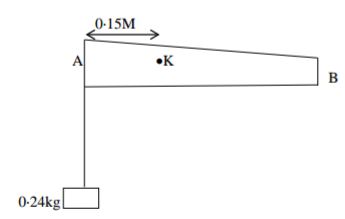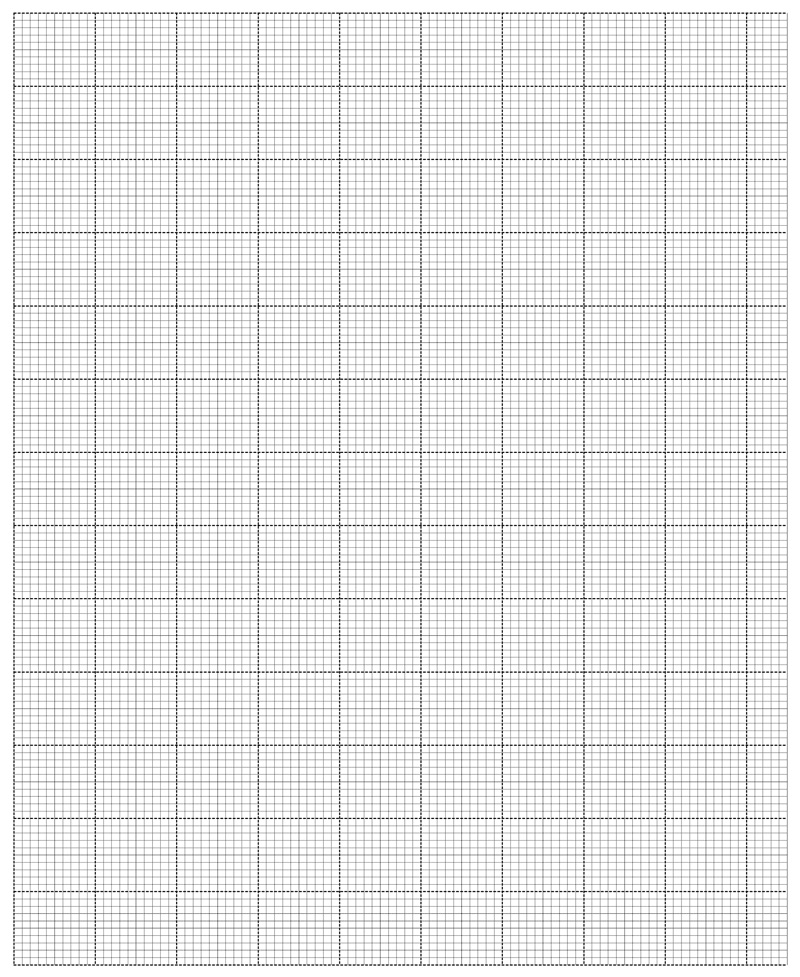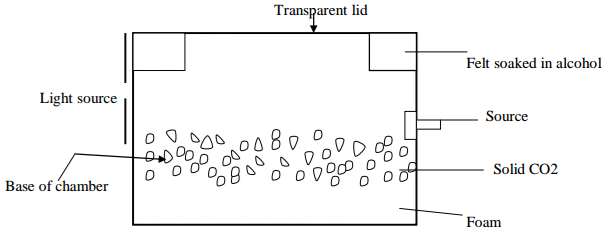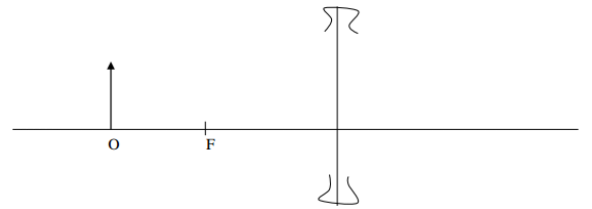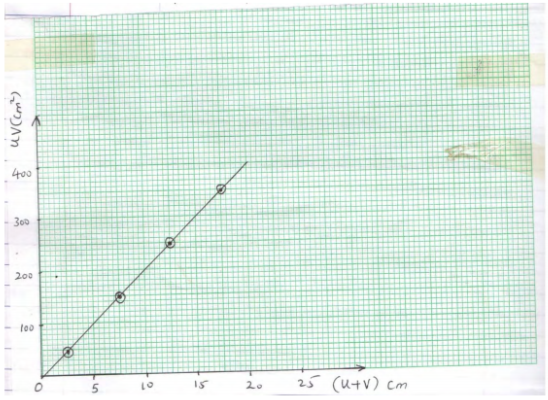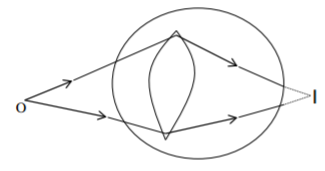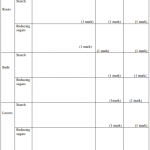KNEC KCSE Physics Paper 2 Question Paper / 2016 KCSE 4MCK Joint Exam
2016 KCSE 4MCK Joint Exam
Physics Paper 2
SECTION A (25 Marks)
The figure above shows an object AB placed in front of a plane mirror. By construction,
complete the diagram to show the position of its image AB and how it is seen by the eye E.
3 marks
A gun is fired and an echo heard at the same place 0⋅6s later. How far is the barrier, which
reflected the sound from the gun? (speed of sound in air = 330m/s)
3 marks
Figure below shows part of the circuit containing two capacitors C1 and C2
If C1 = 2𝜇𝜇F and the pd across PQ = 150V while the total charge in the capacitors is 1⋅8 x 10-4C.
Determine the value of C2
3 marks
The figure below shows an iron ring placed between two magnetic poles.
a) On same diagram, draw magnetic field pattern for the set up. (2 marks)
b) State one application of the property shown in the set up. (1 mark)
3 marks
The figure below shows plane waves approaching a very narrow slit S.
Complete the diagram to show the patterns after crossing the slit.
2 marks
An electromagnetic is made by winding insulated copper wire on an iron core. State three
changes that could be made to increase the strength of the electromagnet.
3 marks
Determine the ammeter reading in the figure below
3 marks
Radio X broadcast on wavelength 150m at a frequency of 200KHz. Calculate the velocity
of the radio waves.
3 marks
A transformer is connected to a 12⋅0v, 30⋅0W lamp from the 240v mains. If the
transformer is 75% efficient, determine the mains current.
3 marks
A current of 13A flows through a heating element of resistance 8⋅5Ω for 1⋅5 minutes.
Calculate the quantity of heat supplied.
3 marks
SECTION B (55 Marks)
Answer all the questions in this section.
The figure below shows a connection to the three pin plug.
a) i) Identify two mistakes in this wiring. (2 marks)
ii) What would happen if this plug was connected to the mains of the socket. (1 mark)
iii) State two reasons why the earth pin is normally longer than the other two pins. (1 mark)
b) A house has five rooms with 240v,60w bulbs. If the bulbs are switched on from 7:00pm
to 10:30pm.
i) Calculate the power consumed per day in Kilowatt – hour. (2 marks)
ii) Find the cost per week for lighting these rooms at Kshs 6⋅70 per unit. (3 marks)
9 marks
a) What is photoelectric effect? (1 mark)
c) In a photometric effect experiment a certain surface was illuminate with radiation of
different frequencies and stopping potential determined for each frequency.
| Stopping potential Vs (V) | 1.83 | 1.42 | 1.10 | 0.6 | 0.2 |
| Frequency f x 1014 (Hz) | 8.0 | 7.0 | 6.0 | 5.0 | 4.0 |
i) Plot the graph of stopping potential (y axis) against frequency. (5 marks)
ii) Determine planks constant, h and the work function 
hf – hf0 where e = 1⋅6 x 10-19 coulombs and hf0 =
can cause photoelectric effect. (4 marks)
iii) A surface whose work function is 2⋅46 ev is illuminated by light of frequency 3⋅0
x 1015 Hz. The maximum kinetic energy of the ejected photoelectrons (use the value
of h obtained in b (ii) above). (3 marks)
13 marks
a) (i) Define background count (1 mark)
(ii) State two sources of background radiation. (2 marks)
(iii) Differentiate between nuclear fission and nuclear fusion. (1 mark)
c) The figure below shows the cross section of a diffusion cloud chamber used to detect
radiation from radioactive sources.
(i)State one function of each of the following (2 marks)
Alcohol __________________________________________
Solid CO2 ________________________________________
(ii) When radiation from the source enters the chamber, some white traces are observed. Explain
how these traces are formed and state how the radiation is identified. (4 marks)
10 marks
a) The figure below represents an object O placed 8cm in front of a diverging lens. F is
the focal point of the lens.
(i) Draw rays to locate the position of the image. (2 marks)
(ii) Determine the image distance V (1 mark)
(iii) Determine the magnification (2 marks)
b) A girl performed an experiment to measure the focal length of a converging lens. In the
experiment a series of object distance U(cm) and image distance V(cm) were obtained and the
graph of UV(cm2) against (U + V)cm as shown below plotted.
Use the graph to determine the:
(i) Focal length of the lens used. (2 marks)
(ii) Power of the lens used. (2 marks)
d) The figure below shows a human eye with a certain defect.
i) Name the defect. (1 mark)
ii) On the same diagram indicate the lens which can be used for correction of the defect.
(1 mark)
11 marks
a) Students set up a mass attached to a spring such that when it oscillates it taps on water
surface in a wide shallow tank as shown
The students found measured time for 20 oscillations and found that the mass takes 36 seconds.
Determine:
i) The periodic time of the mass. (1 mark)
ii) The frequency of the waves produced on the water surface. (2 marks)
iii) The speed of waves if the students counted 4 ripples between the mass and end B of
the tank. (3 marks)
b) The diagram below shows a simple d.c generator.
i) Name the parts labeled X and Y (2 marks)
ii) The coil is rotated in a clockwise direction indicate using an arrow on the figure the
direction of the induced current as the coil passes the position shown. (1 mark)
iii) Sketch on axis below a graph of the emf generated against the angle as the coil rotates
from 0° to 90° and from 90° to 180°
iv) Give reasons for the changes in the emf as the coil rotates from 0° to 180°.(2 marks)
11 marks



